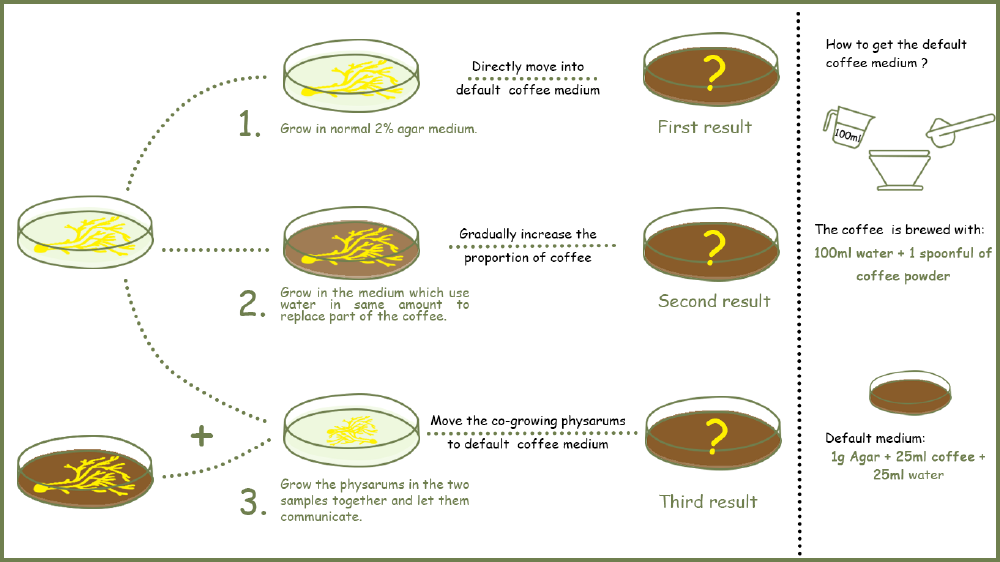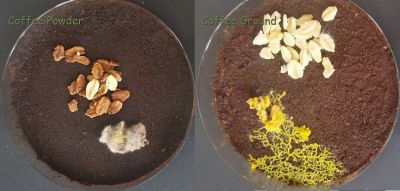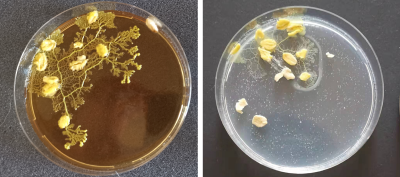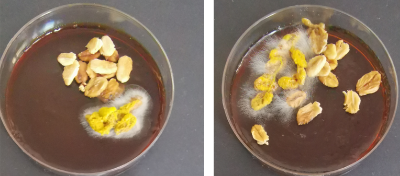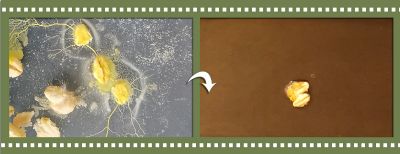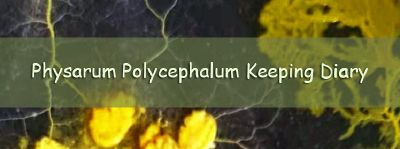Lingfei Liu (talk | contribs) No edit summary |
Lingfei Liu (talk | contribs) No edit summary |
||
| (59 intermediate revisions by 3 users not shown) | |||
| Line 1: | Line 1: | ||
== Direct or Gradual ? == | |||
== [[My Physarum Polycephalum Keeping | <gallery> | ||
File:Result1_ 2.mp4 | |||
File:Result 2_2.mp4 | |||
File:Result 3_ 2.mp4 | |||
</gallery> | |||
The environment plays a very important role in the growth of organisms. In addition to different environments, even the way the environment changes have an impact on them. Facing this, organisms always show different feedbacks. | |||
The different substance is used to grow Physarum Polycephalum to compare their growth. They will make their own corresponding changes to this environmental change. If this unusual living environment is not faced by this Physarum itself but through communication with other Physarum, adapting to the changes in the environment are also passed on. | |||
[[File:idea sketch.png|1000px]] | |||
== Process == | |||
'''Why coffee medium?''' | |||
- They don't like caffeine | |||
When raising the Physarum Polycephalum, many different mediums have been tried. Caffeine is one of the things they don't like coffee. | |||
[[File:they don't like caffeine.jpg|400px]] | |||
- Visible color differences | |||
Coffee itself has a strong color. It's easy to tell its concentration and the difference with a normal agar medium. | |||
[[File:color difference.png|400px]] | |||
'''What is the value of the format medium''' | |||
Using a format medium to grow Physarum Polycephalum: 1g Agar + 25ml coffee + 25ml water | |||
[[File:format value_Result 1.png|400px]] | |||
With this value, Physarum can't grow healthy. So that subsequent experiments are meaningful. | |||
'''How experiments are conducted''' | |||
- Sample 1: Direct move into format medium | |||
[[File:timelapes1.jpg|400px]] | |||
[[:File:Result1_ 2.mp4]] | |||
- Sample 2: Gradual move into format medium | |||
[[File:timelapes 2.jpg|800px]] | |||
[[:File:Result 2_2.mp4]] | |||
- Sample 3: Move into format medium after communication | |||
(Let format-medium-experienced Physarum and non-experienced Physarum grow together in normal medium first, then move the merged Physarum into format medium.) | |||
[[File:timelapes 3.jpg|600px]] | |||
[[:File:Result 3_ 2.mp4]] | |||
'''[[/My Physarum Polycephalum Keeping Diary/]]''' | |||
[[File:Diary 2.jpg|400px]] | |||
== Techinical solution == | |||
In the experiment, the same concentration of coffee will provide caffeine to the medium. Physarums will be split into three Samples. The first one will grow in a normal 2% agar medium at the beginning. And then move into the coffee medium directly. In the second sample, the amount of coffee in the medium will be very small at first. Then after each time, the Physrum has adapted to the new environment, increase the amount of coffee gradually until the concentration of coffee is the same as the default value. | |||
The third sample lets the Physarum who can grow on the default coffee medium and another one who hasn't lived on the coffee medium before, live together for a period of time. After that, move them to the default coffee medium too. Observe and record the difference in the growth of Physarums among the three samples. Find out whether they can adapt to the coffee environment. | |||
The way I took Time-lapse videos: | |||
[[File:equipment box for video.jpg|600px]] | |||
== Inspiration == | |||
'''Experiment 1:''' Between Physarum and the food, scientists built a bridge containing some salt which Physarum doesn't like. But to get food, the slime crossed the salt bridge. After that, the scientist put the slime into hibernation. After resuscitation, it can still cross over the salt bridge, and the speed is faster than the last time. So scientists think they have learning and memory functions. | |||
'''Experiment 2:''' Researchers found that if they put a frog in a pan of boiling water, the frog can quickly jump out. On the other hand, if they put a frog in cold water and put the water to boil over time, the frog will be boiled to death. | |||
== Reference: == | |||
-TED Talk_ Heather Barnett: [https://www.youtube.com/watch?v=2UxGrde1NDA&t=136s Was wir Menschen von halbintelligentem Schleim lernen können] | |||
-The Physarum Experiments - Heather Barnett: [https://www.youtube.com/watch?v=b--9igdjVj0 Short compilation of studies: Study No. 022: Starvation Fireworks / Study No. 019: The Maze (homage to a classic experiment) / Study No. 026: Intraspecies Fusion] | |||
===heather dewey-hagborg=== | |||
<gallery> | |||
File:Screen Shot 2020-05-11 at 4.44.43 PM.png | |||
File:Screen Shot 2020-05-11 at 4.44.57 PM.png | |||
File:Screen Shot 2020-05-11 at 4.45.09 PM.png | |||
File:Screen Shot 2020-05-11 at 4.50.09 PM.png | |||
</gallery> | |||
Latest revision as of 06:46, 5 August 2021
Direct or Gradual ?
The environment plays a very important role in the growth of organisms. In addition to different environments, even the way the environment changes have an impact on them. Facing this, organisms always show different feedbacks.
The different substance is used to grow Physarum Polycephalum to compare their growth. They will make their own corresponding changes to this environmental change. If this unusual living environment is not faced by this Physarum itself but through communication with other Physarum, adapting to the changes in the environment are also passed on.
Process
Why coffee medium?
- They don't like caffeine
When raising the Physarum Polycephalum, many different mediums have been tried. Caffeine is one of the things they don't like coffee.
- Visible color differences
Coffee itself has a strong color. It's easy to tell its concentration and the difference with a normal agar medium.
What is the value of the format medium
Using a format medium to grow Physarum Polycephalum: 1g Agar + 25ml coffee + 25ml water
With this value, Physarum can't grow healthy. So that subsequent experiments are meaningful.
How experiments are conducted
- Sample 1: Direct move into format medium
- Sample 2: Gradual move into format medium
- Sample 3: Move into format medium after communication
(Let format-medium-experienced Physarum and non-experienced Physarum grow together in normal medium first, then move the merged Physarum into format medium.)
Techinical solution
In the experiment, the same concentration of coffee will provide caffeine to the medium. Physarums will be split into three Samples. The first one will grow in a normal 2% agar medium at the beginning. And then move into the coffee medium directly. In the second sample, the amount of coffee in the medium will be very small at first. Then after each time, the Physrum has adapted to the new environment, increase the amount of coffee gradually until the concentration of coffee is the same as the default value. The third sample lets the Physarum who can grow on the default coffee medium and another one who hasn't lived on the coffee medium before, live together for a period of time. After that, move them to the default coffee medium too. Observe and record the difference in the growth of Physarums among the three samples. Find out whether they can adapt to the coffee environment.
The way I took Time-lapse videos:
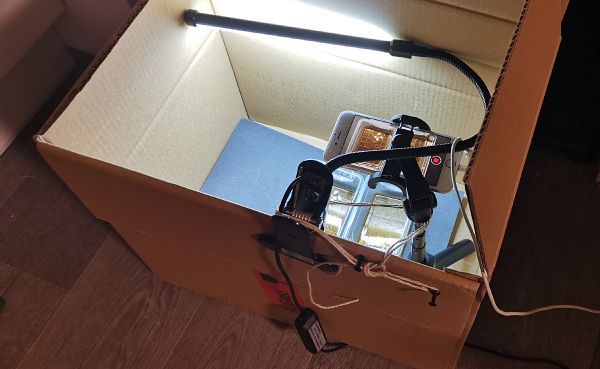
Inspiration
Experiment 1: Between Physarum and the food, scientists built a bridge containing some salt which Physarum doesn't like. But to get food, the slime crossed the salt bridge. After that, the scientist put the slime into hibernation. After resuscitation, it can still cross over the salt bridge, and the speed is faster than the last time. So scientists think they have learning and memory functions.
Experiment 2: Researchers found that if they put a frog in a pan of boiling water, the frog can quickly jump out. On the other hand, if they put a frog in cold water and put the water to boil over time, the frog will be boiled to death.
Reference:
-TED Talk_ Heather Barnett: Was wir Menschen von halbintelligentem Schleim lernen können
-The Physarum Experiments - Heather Barnett: Short compilation of studies: Study No. 022: Starvation Fireworks / Study No. 019: The Maze (homage to a classic experiment) / Study No. 026: Intraspecies Fusion
